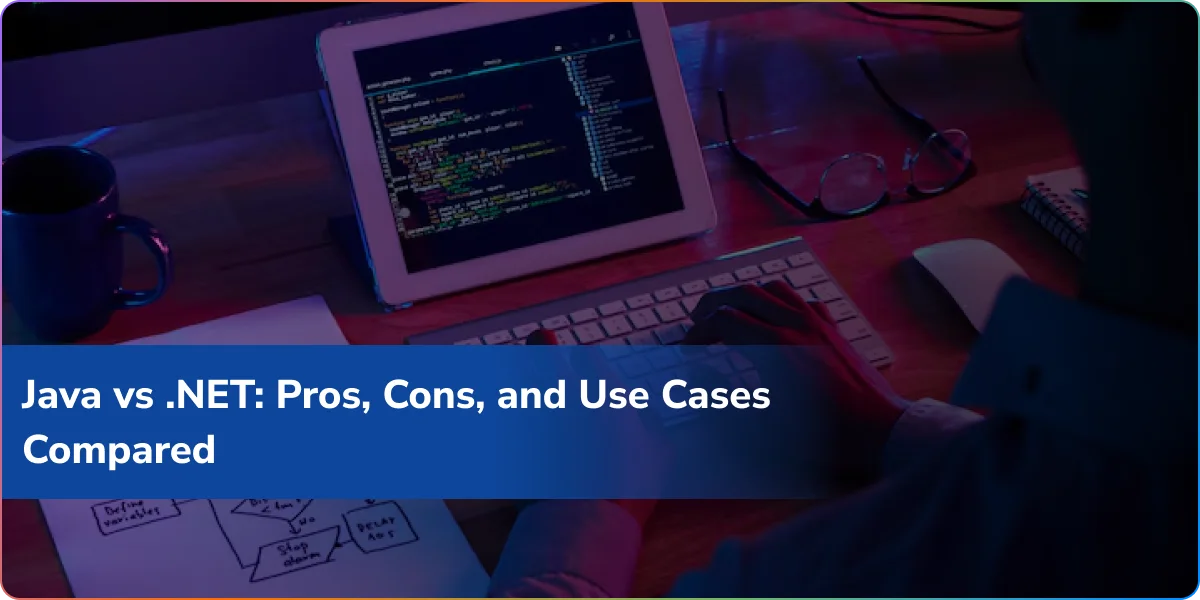Are you building an enterprise app and stuck between dot net vs java? It’s a common dilemma! Both are powerful, but their architectures, use cases, and ecosystems are quite different. Because of this, businesses and developers frequently compare net vs java to decide which one fits their project needs best.
In this blog, we’ll explain the difference between Java and dotnet, highlight the difference between Java and net, discuss their pros and cons, and explore the ideal use cases for each technology.
Overview of Java and .NET
What is Java?
Java is an open-source, object-oriented programming language and platform originally developed by Sun Microsystems (now owned by Oracle). It is platform-independent because of the JVM (Java Virtual Machine), which makes it a popular choice for creating cross-platform applications.
What is .NET?
.NET Framework is a development platform built by Microsoft. It offers a secure and managed environment to create Windows, web, and enterprise applications. The dot net framework supports several languages, including C#, VB.NET, and F#.
Next, let’s look at the pros and cons of each platform to understand the strengths and weaknesses of both.
Advantage and Disadvantage of NET Framework
If you’re wondering whether the .NET Framework is right for your project, let’s break down the advantage and disadvantage of NET Framework
Why developers love .NET:
- Lots of ready-to-use libraries: Need database access, web services, or UI components? .NET has you covered.
- Faster development: Visual Studio makes building apps quick and smooth.
- Secure by design: Great choice for enterprise apps where security is critical.
- Multiple language options: You can code in C#, VB.NET, and more.
Where .NET can fall short:
- Windows-focused (at first): The traditional framework worked mostly on Windows. Thankfully, .NET Core fixed this with cross-platform support.
Can get pricey: Enterprise versions of Visual Studio and some libraries can cost extra. - Less open-source: Compared to Java, the community-driven libraries are fewer.
Advantages and Disadvantages of Java
Now, what about Java? Here’s why many developers swear by it (and where it struggles).
Why Java stands out:
- “Write once, run anywhere”: Thanks to JVM, your app works on Windows, Linux, or macOS without major changes.
- Open-source friendly: Huge community and tons of free tools.
- Scalable: Perfect for enterprise-level systems and big apps.
- Cross-platform: Seamlessly runs across different operating systems.
Where Java struggles:
- Memory-hungry: Java apps can use more RAM than .NET apps.
- Can be slower: The JVM adds a layer, so sometimes performance lags compared to .NET.
- Verbose code: You may end up writing more lines of code than in C#.
Difference between Java and DotNET: A Comparison
| Feature / Aspect | Java | .NET Framework |
| Platform Independence | Runs on JVM, platform-independent. | Traditionally Windows-based; now cross-platform with .NET Core/.NET 6+. |
| Languages Supported | Primarily Java. | C#, VB.NET, F#, and more. |
| Runtime Environment | Java Virtual Machine (JVM). | Common Language Runtime (CLR). |
| Development Tools | Eclipse, IntelliJ IDEA, NetBeans. | Microsoft Visual Studio. |
| Deployment | Packaged as JAR/WAR files. | Compiled into assemblies (.dll/.exe). |
| Open-Source Support | Large open-source community. | Growing open-source ecosystem but more enterprise-driven. |
| Best Use Cases | Cross-platform apps, Android, big data tools. | Windows apps, ASP.NET web apps, Azure integrations. |
| Performance | Great scalability, JVM tuning available. | Fast on Windows, excellent integration with Microsoft stack. |
| Cost | Open-source, free tools available. | Visual Studio enterprise versions may require licensing. |
| Integration | Works well with diverse open-source tools. | Seamless with Microsoft services like Azure, Office 365. |
Java and Dotnet: Use Cases
When comparing java and dotnet, the right choice depends on the type of application you want to build:
Best Use Cases for Java:
- Great for cross-platform desktop applications.
- Ideal for enterprise backend systems like banking and insurance.
- Widely used for Android app development.
- Powers big data tools such as Hadoop and Apache Spark.
Best Use Cases for .NET:
- Perfect for Windows-based desktop applications.
- Suitable for enterprise web apps integrated with Microsoft Azure.
- Commonly used for ERP and CRM enterprise solutions.
- Excellent for ASP.NET web services and dynamic websites.
These use cases highlight the difference between Java and dotnet, helping businesses and developers choose the right platform in the ongoing dot net vs java debate.
Net and ASP.NET Difference
When talking about net vs java, many people confuse .NET with ASP.NET. Here’s the net and asp net difference:
- .NET Framework: The main platform for building different types of applications like Windows desktop apps and enterprise software.
- ASP.NET: A part of the dot net framework used specifically to create web applications and web services.
Example: If you’re building a Windows accounting software, you’ll use .NET Framework, but if you’re making an online shopping website, you’ll use ASP.NET.
So, when comparing java and dotnet, remember ASP.NET is just one part of the bigger .NET ecosystem.
Which One Should You Choose: Java or .NET?
Your choice depends on project needs and platform preferences.
Pick Java if:
- You need a cross-platform solution for Windows, Linux, or macOS.
- You want open-source tools and a large developer community.
- Example: Banking systems (like ICICI Bank) or Android apps (e.g., early Instagram).
Pick .NET if:
- You’re building Windows-based or enterprise-level apps.
- You need seamless integration with Azure or Microsoft services.
- Example: Web apps for companies like Stack Overflow or internal ERP/CRM tools.
Cost & Developer Availability:
Another point to consider is how easy it is to find skilled developers:
- Java has a huge global community, so hiring for cross-platform projects is often simpler and more cost-effective.
- .NET experts are highly valued in enterprises that rely on Microsoft tech, making them ideal for Windows and Azure-based solutions.
Contact us today to hire skilled Java and .NET developers and bring your enterprise application to life!
Key takeaway:
- Java is best for cross-platform, Android apps, and open-source enterprise systems.
- .NET is best for Windows-focused, enterprise-grade, and Azure-integrated applications.
Future Trends: Net vs Java
Both technologies are evolving to keep up with modern app development and cloud demands.
Java’s Future:
- Frequent updates improve speed, security, and scalability.
- Modular architecture (Java 9+) allows lighter, faster apps.
- Popular for cloud-native and microservice-based systems.
- Example: Netflix relies on Java microservices to manage heavy traffic.
.NET’s Future:
- Transitioned to .NET 5/6+, making it fully cross-platform.
- Works on Windows, Linux, and macOS.
- Strong Azure integration and container support suit enterprise solutions.
- Example: Microsoft Teams uses .NET for the backend and smooth Microsoft ecosystem integration.
Conclusion
The debate on dot net vs java has no universal winner. Both are powerful platforms, but their strengths lie in different areas.
Ultimately, the choice between net vs java depends on your business goals, team expertise, and project requirements. For many enterprises, the decision isn’t just technical—it’s also about developer availability, long-term maintenance, and integration needs.
Still confused between dot net vs java? Our expert developers at Logixbuilt Solutions can analyze your project needs and recommend the best stack for performance, scalability, and cost-efficiency.
FAQ’s
1. What is the main difference between Java and .NET?
Java can run on any operating system using the JVM, making it platform-independent. .NET was mainly for Windows earlier, but now supports cross-platform development with .NET Core.
2. What are the advantage and disadvantage of NET Framework?
Advantages: Large set of built-in libraries, strong security features, works seamlessly with Microsoft tools like Azure and speeds up development with Visual Studio.
Disadvantages: Older versions were limited to Windows. Enterprise tools may have licensing costs.
3. Which is better for enterprise applications: Java or .NET?
Java is best for cross-platform apps and open-source projects, while .NET is best for Windows, Azure-based, and enterprise-level apps.
4. What is the difference between .NET and ASP.NET?
.NET is a full framework for building different types of applications, whereas ASP.NET is a part of .NET used specifically for web applications and APIs.
5. Is Java more popular than .NET?
Yes, globally Java has a larger community because it’s open-source and runs on multiple platforms. However, .NET is widely used in enterprises that rely on Microsoft technologies.

